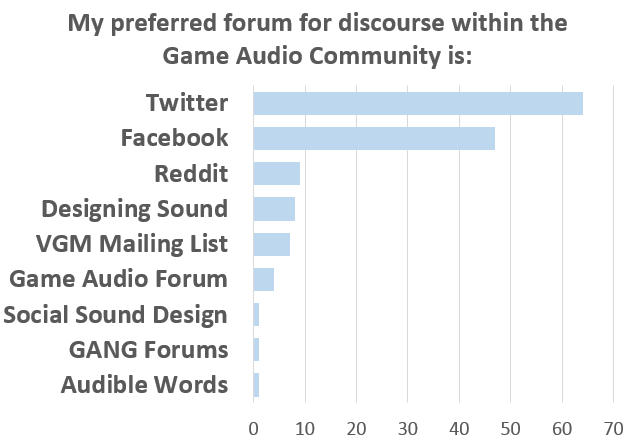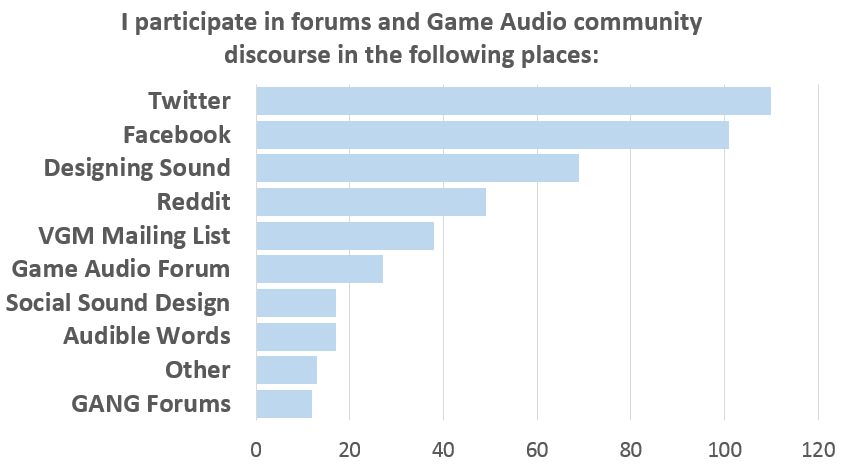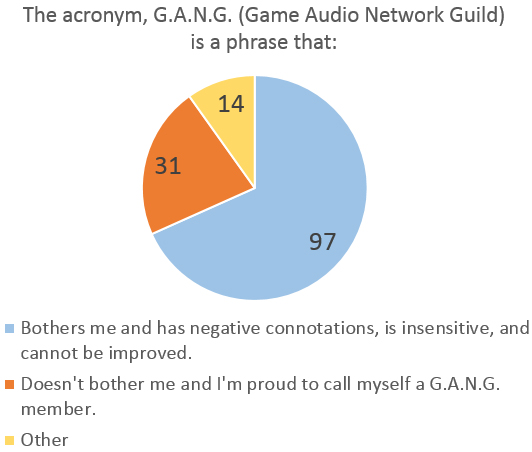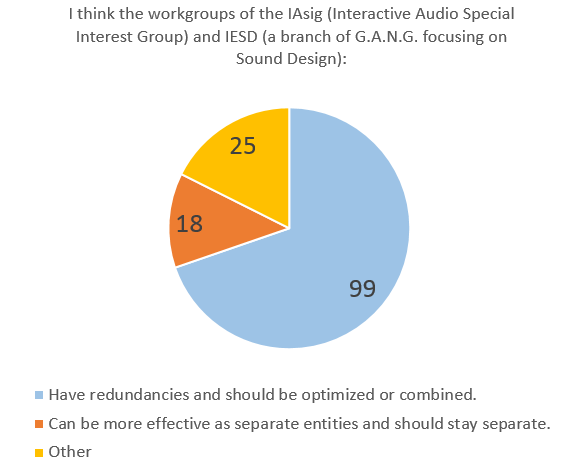Trending
Opinion: How will Project 2025 impact game developers?
The Heritage Foundation's manifesto for the possible next administration could do great harm to many, including large portions of the game development community.

Featured Blog | This community-written post highlights the best of what the game industry has to offer. Read more like it on the Game Developer Blogs or learn how to Submit Your Own Blog Post
A follow-up article which presents the results of a survey regarding game audio organizations and gives further voice to the community. It’s my hope that continued discussion can influence the future of the organizations that represent game audio.


(This article is a cross-post of the original article published at designingsound.org)
The article Brighten the Corners of Game Audio, that I wrote earlier this year, attempted to bring forward some of the things that I’ve experienced, specifically at the Game Developer Conference, and have gleaned from conversations with people in the game audio community over the years in relation to the organizations that represent us. This follow-up article presents the results of the survey that accompanied that article and gives further voice to the community. It’s my hope that continued discussion can influence the future of the organizations that represent game audio.
The great news is that the Game Audio Network Guild (G.A.N.G.) and Interactive Audio Special Interest Group (IAsig) are both open to new ideas, change, and positive forward motion. The game audio community has blossomed thanks to hard work and the support of people seeking to legitimize and bring attention to the craft and talent of our discipline. Harnessing the combined power of an organized group, the efforts of many, unified in direction, has the ability to move mountains. It’s my feeling that working together, hand-in-hand with organizations that seek to represent game audio, that progress can be made towards the best representation of the community’s values.
It’s with great hope for change that I encourage anyone who cares about the future of game audio to find a way to channel positivity towards that path. I believe that finding ways to encourage the voicing of different perspectives is fundamental to changing the sometimes-stagnant paradigm of institutional thinking and decay. Maintaining awareness for the art of game audio is something that everyone working in the industry has a stake in. Whether this is simply participating in discussions respectfully in opposition to the status-quo, or in support of initiatives, the inclusion of all voices can create a choir that rises above feelings of exclusivity and ensure that the message being broadcast accurately represents the community.
The Game Audio Network Guild Award ceremony is a cornerstone of the game audio GDC experience. The event is an opportunity for the community to assemble and recognize the hard-work and achievements of some of the people and teams who’ve created inspiring game audio over the past year. It’s a moment of grand spectacle and celebration during the week-long educational and networking overload that the conference can be. While the Independent Game Festival & Game Developers Choice awards also recognize audio as part of game development, the G.A.N.G. Awards aims to represent the pinnacle of game audio within our community.
Like any awards show, the G.A.N.G. Awards show is not without its own drama, but despite silent protests and rumor-mongering, the event is worth supporting for the positivity and recognition that it brings to members of the community. That said, as evidenced by the opinions that have surfaced in the survey, some felt greater strides could be taken to make the event feel more professional.
In response to insensitivities raised in the original article, Brian Schmidt, the President of G.A.N.G., has made the following statement that will hopefully inform decisions regarding the award proceedings in the future:
“At this year’s G.A.N.G. Awards, we showed some interstitial videos which, plainly put, we shouldn’t have. As the person ultimately responsible for what occurs during the awards, I apologize to anyone who was offended by them.” – Brian Schmidt
Couple this statement with the recent announcement [1] that the organization is “…drafting a G.A.N.G. Code of ethics, representing the core values of the organization” and it would seem that the organization leaders are working to stabilize their position on the issue of inclusiveness. Call it a moment of clarity as a rising-tide of sensitivity finally reaches the shore, or an example of the power of feedback under current leadership; the community stands to benefit from this commitment to creating a culture that respects itself and the community enough to define what “professional” behavior is expected as part of an organization.
The original article questioned whether the G.A.N.G. Forum continued to be of value to its membership as an exclusive benefit. Of the 142 survey responses, the majority prefer Twitter & Facebook for game audio community discourse. [2]

Survey Results: My preferred for discourse within the Game Audio Community is:
When asked to list all of the places a person participated in game audio discussions, forums ranked significantly lower than Twitter, Facebook, and other sound-centric websites. [3]

Survey Results: I participate in forums and Game Audio Community discourse in the following (online) places:
“The forums (are) something we have been thinking about hard lately. When G.A.N.G. was founded, there was no Facebook, no Twitter, no Vine, Reddit, Instagram… So the forums represented one of the few online places where the game audio community—from veteran to student– could easily communicate and exchange ideas and questions with each other; ‘walled communities’ was the norm as this new-ish “web 2.0” was taking shape. “Social networking” changed things dramatically. Today, forums may not make sense as a primary method of communication.” [4] – Brian Schmidt
In a recent announcement [5], G.A.N.G. has stated that they will be “…phasing out our forums and moving our discussions exclusively to email and social media, particularly the G.A.N.G. Facebook page.” The acknowledgement of the lack of activity on the forums and the embracing of existing spaces for discourse is a welcome refocus that keeps the value of supporting the organization squarely upon its pillars.
The survey results on this issue reveal that 97 of 142 respondents feel that: “The acronym, G.A.N.G. (Game Audio Network Guild) is a phrase that: Bothers me and has negative connotations, is insensitive, and cannot be improved.” [6]

Survey Results: The acronym, G.A.N.G. (Game Audio Network Guild) is a phrase that:
If the goal of the Game Audio Network Guild is truly to be “your global game audio community – without borders, without limits, and without exclusion.” then my question remains: “Why maintain obvious controversy as part of an organization’s acronym?”.
It’s fair to say that depending on the context of its use, the term “gang” can swing in either direction. However, the word carries with it a host of potential misinterpretations which undermine what I think is meant to be an inclusive term representing the organization and the community. Or as RJ Mattingly commented in response to the original article: “Why allow a group so centered around inclusiveness to even potentially be misconstrued with one of exclusiveness?” There is a huge group of young hopefuls poised to enter the game industry all over the world who only associate the word “gang” with violence. Why would an organization hold tight to an acronym which could even possibly be misunderstood?
Renaming the Game Audio Network Guild could go a long way towards rebranding in a style that better represents its current charter. Changing the name might seem like a small thing, but I believe it could better lead the organization towards inclusiveness.
Overwhelmingly, those polled believe that there are redundancies between the IESD and IAsig that could be optimized or combined. [7]

Survey Results: I think the workgroups of the IAsig (Interactive Audio Special Interest Group) and IESD (branch of G.A.N.G. focusing on Sound Design):
With the acknowledgement and suggested potential for collaboration, the time is right for contributors within both organizations to imagine a streamlined solution for delivering standards and recommendations to the game audio community. The first step is to view both entities as working towards the same goals, and find ways to optimize the efforts of passionate contributors.
Once-upon-a-time, the IAsig was moving in more hardware-centric circles and the G.A.N.G. branch of the Interactive Entertainment Sound Designers (IESD) was, according to Brian Schmidt “…created to counter the feeling within G.A.N.G. that it was too music/composer focused and didn’t give enough attention to the sound aspects of our industry.” [8] Both organizations have evolved into providing recommendations and guidelines, which is great! The question remains as to whether they would be better off collaborating and optimizing the energy available towards these shared goals.
Brian’s comment, in response to the original article, suggests that leadership is open to this idea: “…we all seemed to feel that there was enough of a difference in focus and in ‘vibe’ that it made sense to keep the organizations separate. Perhaps things have changed significantly since we last broached the issue. I would be very happy to entertain the notion of a tighter cooperation between IAsig and G.A.N.G.” [9]There is technically nothing standing in the way of this collaboration, whether it’s simply the mutual adoption of recommendation, or the pooling of (knowledge) resources and content matter experts. Kurt Heiden, Chairman on the IAsig, responds: “I do see potential benefits from greater collaboration and clarification between the two organizations…I’m not sure we would need to be one organization to accomplish that goal but we would need more frequent communication than we have today…I’m always open to new ideas.” [10]
With both organizations open to working together towards common goals, it feels like the beginning of something. Some further suggestions from Kurt “…Since IAsig work is often intended to benefit the fields that G.A.N.G. members work in, it would help to have G.A.N.G. spread the word widely on our behalf when working groups begin and when a final document or resource is published….Maybe a bi-annual or quarterly conference call or a shared online resource for both groups to post cross-organizational topics? Maybe a single point, joint G.A.N.G. – IAsig membership discount for joining both groups at once?” Ultimately the idea of this collaboration relies on the motivations of the two organizational groups and their members to build a bridge between combined efforts.
Game Audio organizations and social media offer a worldwide window into our community’s culture. While on the whole I believe that we are doing an excellent job representing an inclusive and broad community in these channels, continuous improvement can help ensure that as the community grows, we grow as not just an inclusive and friendly community within, but hope to serve as a model for other work-based communities.
Our organizations serve as not just a meeting point and networking opportunity, but as the voice of those who may be intimidated to speak out, particularly those new to game audio. We must continually ask ourselves if and how we are serving the needs of the entire community—new and established, national and international, and how we can continue to foster and nurture the fledgling industry as we move into the future.
Without an influx of new ideas and energy, the fruits of an organizations labors cannot grow with the changing industry. Instead, the good work they’ve begun will be left to wither and die on the vine due to antiquated thinking, detachment with current trends, and stagnation from inactivity. Our game audio organizations require fresh perspectives. Many of us feel that there has been good work done up to this point, and that there is more to do as we continue to expand. The question is, who will help to support and shoulder the burden?
The title of this article can be read two ways: dismissive and ambivalent or as a rally for contributors. How you choose to respond speaks volumes on the future of game audio organizations and their role. Who cares about game audio organizations?
Read more about:
Featured BlogsYou May Also Like